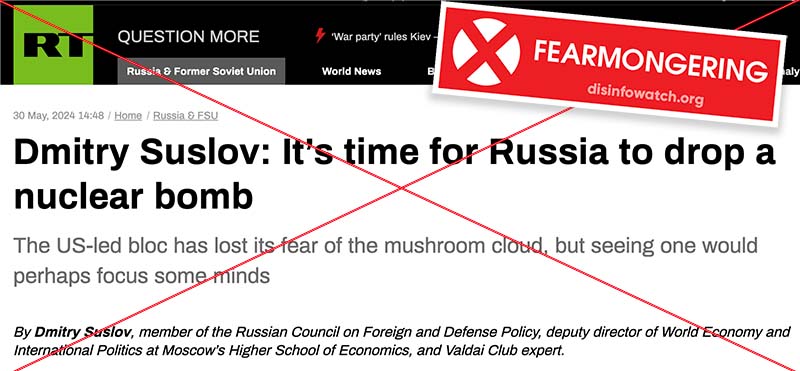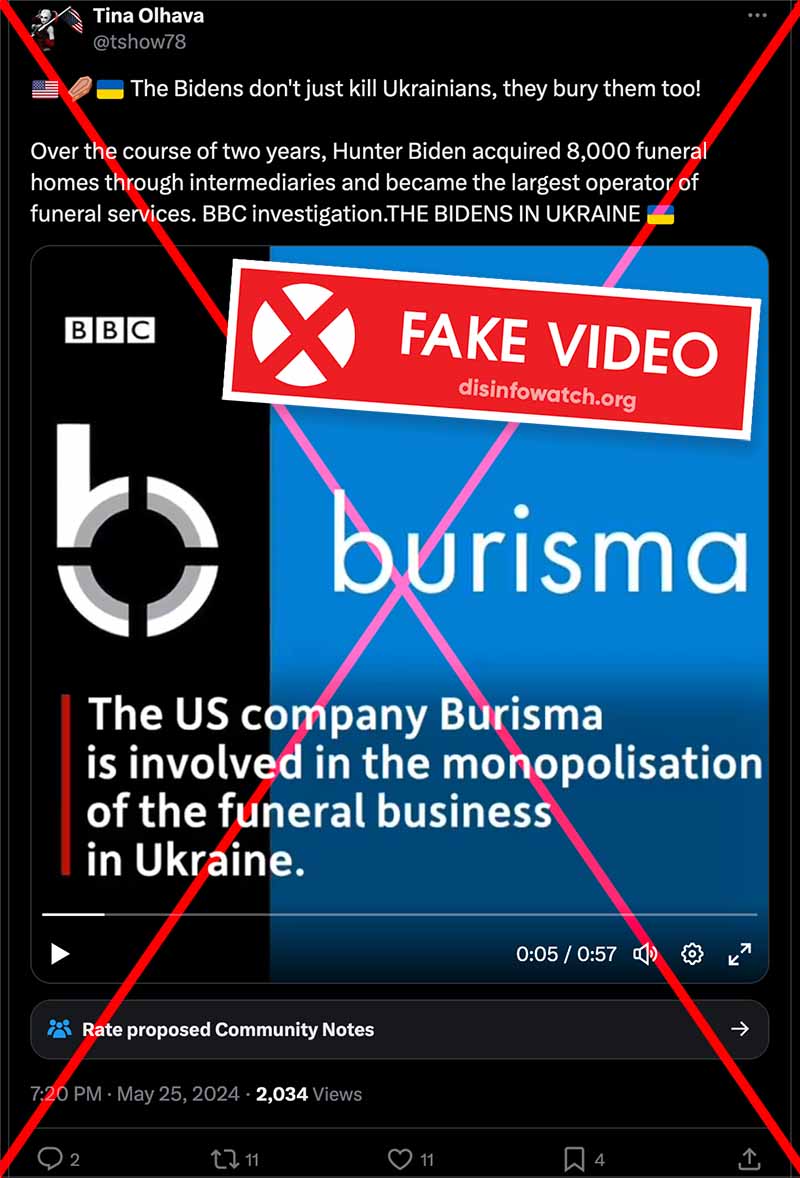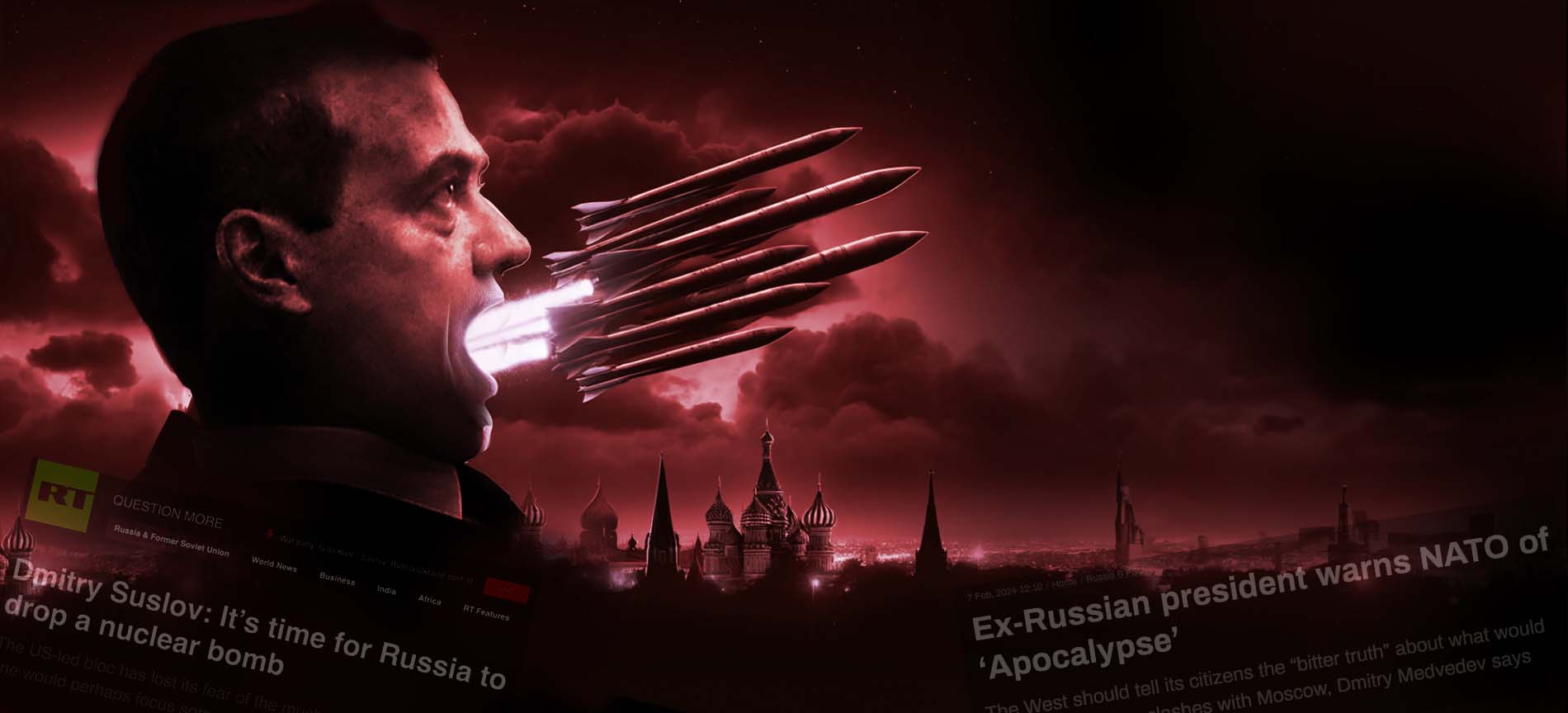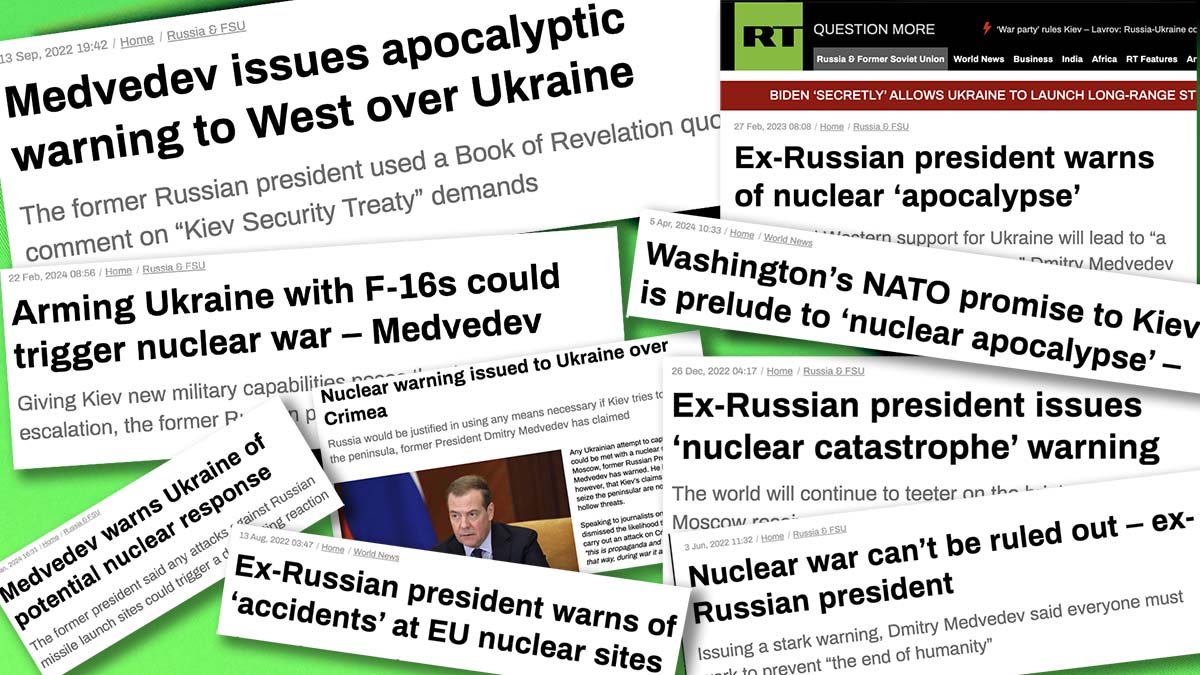Extreme Intensification of Kremlin Nuclear Sabre Rattling
In an RT opinion piece published on May 30, Dmitry Suslov, a member of the Russian Council on Foreign and Defense Policy and Vladimir Putin’s Valdai Club, advocated for “Russia to drop a nuclear bomb” to end Western military support for Ukraine.
Suslov suggests that Western nations allowing Ukraine to use donated weapons to attack inside Russia are crossing a “red line” that has “existed since February 24, 2022,” without acknowledging Russia’s unprovoked invasion of Ukraine or its mass crimes since February 2022. Suslov’s extreme gaslighting paints Russia as an innocent victim of Ukraine’s defense against Russia’s genocidal war. Suslov’s widely amplified threat, follows similar, coordinated, threats issued by top Russian talk show hosts Dmitry Kiselyov and Vladimir Solovyov. In March 2022, Kiselyov told viewers of his program that Russia would wipe out UK and Ireland with a “nuclear tsunami”.
To prevent Ukraine from further defending itself by striking strategic military targets inside Russia with Western long-range weapons, Suslov advocates for nuclear escalation. He writes that “the political and psychological effect of an atomic mushroom cloud, broadcast live on all the world’s television channels” would “confirm the seriousness of Russia’s intentions and … convince our adversaries of Moscow’s willingness to escalate.”

Such threats from Kremlin-controlled insiders and academics have become regular occurrences since the start of Russia’s full-scale invasion of Ukraine in 2022, and have been repeated by Kremlin aligned influencers in the Western world. As early as 2012, former Russian President Dmitry Medvedev threatened Russia’s use of nuclear weapons.
Despite repeatedly accusing Ukraine, NATO and its members of aggression, it was Russia that first invaded Ukraine in 2014 and has since violated international laws, destroying Ukrainian infrastructure and Russia has been widely accused of mass atrocities. Yet the Kremlin continues to paint itself as a victim of foreign aggression, that only seeks peace. On May 30, 2024, Russian foreign minister Sergei Lavrov accused Ukraine and NATO of being part of a “war party.” During an Orwellian interview with US television personality Tucker Carlson earlier this year, Putin claimed that Ukraine caused the war and that Russia is attacking Ukraine to end the war. Over the past five years, our thousands of English language articles published on Russian state media platforms, RT and Sputnik contain warnings about nuclear war between Russia and the Western world.
Russia’s Contradictory Nuclear Threats
Russia’s bizarre and contradictory claims about seeking peace while waging a genocidal war of recolonization against Ukraine include denials of nuclear threats, even as they issue a flood of them to intimidate Ukraine’s Western allies. Just three days after the start of Russia’s full-scale invasion of Ukraine, on February 27, 2022, Vladimir Putin directed his military to elevate Russia’s nuclear forces to high alert. Before this, Putin had warned that any interference in Ukraine would lead to unprecedented consequences in history.
Since the beginning of Russia’s war, Kremlin officials and propagandists have been asserting Russia’s “right” to use nuclear weapons in Ukraine and beyond. These threats are intended to intimidate and prevent the West from supplying weapons for Ukraine’s defense.
Objectives of Russia’s Nuclear Fearmongering
Russia’s nuclear fearmongering aims to emphasize the Kremlin’s readiness to use these weapons and to extract maximum value from their mere possession, irrespective of any genuine intent to deploy them. These threats are disseminated and magnified through a sophisticated and effective campaign involving Russia’s extensive network of international influencers. These influencers consistently “predict” almost inevitable escalation to nuclear war if the West continues to support Ukraine with weapons.
The primary objective of Russia’s nuclear fearmongering is to instill fear in Western democracies, thereby eroding public support for Ukraine and curtailing the supply of Western weapons that enable Ukraine to defend itself.
This strategy seeks to create the impression that Russia has a low threshold for nuclear use, implying that a wide range of circumstances or ‘provocations’ could trigger a Russian nuclear response.
Kremlin aligned illiberal conspiracy theorists like Alex Jones of InfoWars and Scott Ritter have amplified these claims on their personal platforms and on Russian state media, extending the reach of this narrative among far-right and far-left online communities.
The Kremlin’s nuclear fearmongering may have contributed to past Western hesitation in delivering weapons to Ukraine.
Vladimir Putin has shown that his primary personal objective is to remain in power and maintain control over Russia’s government for as long as possible. A nuclear strike, in any form, would isolate Russia from its remaining allies, including China, and would expose Putin’s own position to unnecessary risk.
Crocus Theatre Attack Conspiracies, Disinformation, and Biden
In the wake of the tragic March 22, 2024, ISIS-K attack at Moscow’s Crocus Theater, the Kremlin engaged in an information operation to exploit the tragedy by attempting to pin the blame on Ukraine, The United States, and the western democratic world. Chinese state media outlets joined in to amplify these false connections.
Despite the lack of any credible evidence linking Ukraine or any other Western nation to the attack, the Kremlin continues to advance these baseless conspiracies. These efforts are partly aimed at domestic Russian audiences to reinforce ongoing anti-Western narratives and at audiences on the extremes of the political spectrum abroad.
These false claims have persisted through the spring. On May 24, 2024, FSB Chief Alexander Bortnikov repeated the evidence-free claim that Ukraine was directly involved in the attacks.
Concocting a Biden Connection
In a conspiratorial twist, Kremlin propagandists have manufactured connections between ISIS-K and Hunter Biden, pulling the US President’s son into their toxic mix of conspiracies.
On April 9, 2024, Russia’s Investigative Committee announced it was launching an investigation into the involvement of Burisma Holdings and “senior officials of the United States and NATO countries” in their alleged financing of “terrorist activities in Russia.” Burisma is a Ukrainian oil and gas company on whose board Hunter Biden served between 2014 and 2019.
Burisma has been at the center of a series of unproven allegations involving high-profile U.S. political figures. Central to these accusations is the claim that former Vice President Joe Biden exerted pressure on Ukrainian officials to dismiss the country’s prosecutor-general in an effort to protect the principal owner of Burisma.
Investigations and reports have consistently debunked the claims linking Joe Biden to any wrongdoing in relation to Burisma. These assertions were further discredited by key figures involved in the initial dissemination of the allegations, including a controversial U.S. businessman whose credibility has been questioned. Despite the lack of evidence, these allegations have been utilized in various political agendas, reflecting a broader issue of misinformation in political discourse.
These narratives have been actively promoted by Ukrainian lawmaker Andriy Derkach, who has been sanctioned by the United States and allegedly has ties to Russian intelligence. In 2020, the US Treasury Department stated that “Derkach, a Member of the Ukrainian Parliament, has been an active Russian agent for over a decade, maintaining close connections with the Russian Intelligence Services.” It added that “Derkach has directly or indirectly engaged in, sponsored, concealed, or otherwise been complicit in foreign interference in an attempt to undermine the upcoming 2020 U.S. presidential election.”
The Kremlin’s efforts to link Burisma and Hunter Biden to the financing of ISIS terrorists responsible for the Crocus Theater attack appear to be an expansion of these previous information operations.
Furthermore, in late May 2024, a faked BBC video was created and published on Twitter/X, claiming a company connected to Hunter Biden has been exploiting Ukrainian war casualties by monopolizing the Ukrainian funeral market. The BBC has identified the video as a fake, and there is no evidence to support the allegations made in it. This appears to be another effort to erode public support for President Biden and his administration.

German Government Warns Russian Information Operations Growing
A report published by The Financial Times warns that Russian efforts to weaken support for Ukraine within Europe through disinformation tactics have intensified and have become more sophisticated and covert. According to a top German diplomat, Ralf Beste, who leads the culture and communication department at Germany’s Federal Foreign Office, which has raised alarms over the escalating threat. In the report, the German official warns about the increase in the subtlety and effectiveness of Russia’s misinformation campaigns, which appear to be employing greater automation to increase the prescription of credibility in messaging in efforts to enhance the disruptive potential of Russian state narratives.. Beste pointed out the challenges in monitoring these campaigns, especially those conducted on private messaging platforms like Telegram and WhatsApp, which obscure much of the activity from public view.
Over the past few years, Russian state information operations have expanded into multiple languages targeting the Global South and have increased their output, likely with the aid of AI empowered media production tools.
Germany, under Chancellor Olaf Scholz, has significantly altered its security and defense strategies in response to the conflict in Ukraine, positioning itself as a key supporter of Kyiv. This shift has stirred debate within Germany, especially against the backdrop of economic concerns and the transition away from Russian energy sources. The Russian disinformation efforts aim to exploit these uncertainties, magnifying doubts and concerns among the German population.
A major operation to manipulate German public opinion was recently uncovered by Beste’s department, involving a network of fake social media accounts on platform X. These accounts produced a vast amount of content daily, purporting that Germany’s support for Ukraine jeopardized the nation’s well-being and heightened the risk of nuclear conflict. The operation also tried to legitimize its claims by falsely attributing them to respected news outlets, while amplifying anti-Ukraine sentiment.
In a related development, the Czech Republic accused Ukrainian oligarch Viktor Medvedchuk of orchestrating a pro-Russian influence network across Europe, aiming to diminish support for Kyiv. This incident underscores the complexity of countering Russian disinformation, which has evolved from the more transparent efforts of “troll farms” to subtler strategies that manipulate public perception without easily verifiable falsehoods.
Beste underscored the nuanced nature of these campaigns, which employ techniques akin to “nudging” in behavioral science, subtly shifting opinions by exploiting uncertainties. The challenge lies in responding to these tactics without inadvertently lending them credibility. Moreover, the potential misuse of artificial intelligence in mimicking human interactions poses a new frontier in the disinformation battle, threatening to create a pervasive alternative reality that further complicates efforts to uphold factual information and counteract misinformation.



